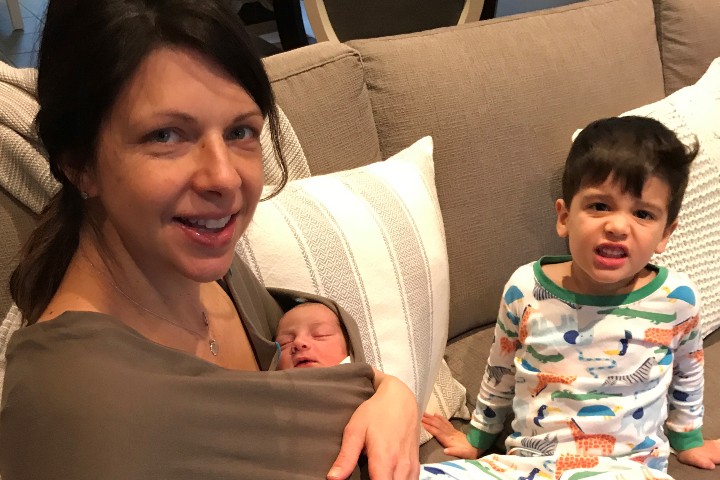Toronto mom Heather Eldebs knew something was off soon after she gave birth to her son Joey five-and-a-half years ago.

“I lost my appetite and I was not sleeping and just not seeing any joy in life at all,” the 42-year-old bank employee and part-time fitness instructor said.
Eldebs was diagnosed with postpartum anxiety and depression – something she would also go on to struggle with after the birth of her second child, daughter Allison, three years later.
“It was quite traumatic .. even to the point where we questioned whether or not we want to have any more children, because it was a really, really rough period,” she told Global News.

In Canada, almost one-quarter of mothers who recently gave birth reported feelings consistent with either postpartum depression or an anxiety disorder, according to a 2019 survey by Statistic Canada.
Over the past year, the COVID-19 pandemic has only exacerbated the mental health challenges for new mothers.
A new study published in the Canadian Medical Association Journal (CMAJ) on Monday showed that between March and November of 2020, mental health visits during the postpartum period — the first year after birth — to both family physicians and psychiatrists were 30 per cent higher than before the pandemic.
Researchers at the Women’s College Hospital and ICES, a non-profit research institute based in Toronto, Ont., looked at data on more than 137,600 eligible postpartum people in Ontario.

Get weekly health news
They found that increases from expected visit rates were greater during the first three months after giving birth compared with 91 to 365 days from the date of delivery.
“That’s quite concerning to us because it really suggests that people aren’t just struggling there, they are suffering from issues that we really need to provide treatment for,” said Dr. Simone Vigod, a psychiatrist at Women’s College Hospital and lead author of the study.

A lack of social support amid COVID-19 restrictions and the stress from the pandemic largely contributed to more women seeking help related to mental health, Vigod, who is also a scientist at ICES, said.
Many were unable to attend breastfeeding clinics, peer-support groups and meet new parents, or have public health nurses visit them amid lockdowns, she added.
Speaking from her own past experience with postpartum depression, Eldebs said “This is an especially hard time to be going through something like that.”
Meanwhile, the way people sought medical assistance last year also changed with virtual visits becoming the norm.
In March 2020, 46 per cent of postpartum mental health visits were virtual, increasing to nearly 85 per cent in April, compared with only three per cent of visits in the pre-pandemic period, the CMAJ study showed.

Despite the challenges, the flexibility of getting virtual care from the comfort of one’s home in the early days of motherhood has been a “silver lining” to the COVID-19 pandemic, Vigod said.
But she was concerned that women living in lower income neighborhoods had less of an increase in their visit rates than those in higher income neighbourhoods.
Two-and-a-half years after the birth of her youngest, Eldebs says she is out of deep depression, but is still on a low dose of medication.
Looking back, she now wishes there was greater awareness about postpartum anxiety during her prenatal days.
Either during the early pregnancy checkups or during the prenatal courses, Eldebs said there needs to be “some real knowledge transfer awareness and acceptance” to help women cope better.

According to Vigod, Canada is still lagging behind being able to offer affordable and accessible therapy for postpartum depressive disorders.
She said there are also gaps in terms of access to specialist physician care around what medications to use, stressing that more work needs to be done.
“The biggest thing I would like to see is that postpartum and pregnant women have a place they can go where someone can help them to say, ‘OK, this is what’s happening with you, this is the kind of care you need, and we know where you can get it and we can get it for you in a timely way’.”










Comments
Want to discuss? Please read our Commenting Policy first.